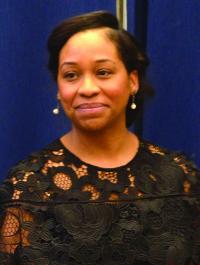January 3, 2018

The Boston City Council voted unanimously on Monday to elect Andrea Campbell as its next president, making her the first African-American woman to hold the seat from which she will preside over the most diverse council in the body’s 108 years of operation.
Newly re-elected to represent District 4, Campbell said at the first council meeting following the New Year’s Day inauguration and swearing-in ceremony that councillors will continue to work with the mayor, but also “challenge the status quo” to advocate for policies supporting residents who are unable to take advantage of the city’s opportunities.
Six women of color now sit on the council, including first-term councillors Lydia Edwards in District 1 and Kim Janey in District 7, who were elected in November along with District 2 Councillor Ed Flynn.
“I’m so excited for all three of them to join this body,” Campbell said in a meeting with reporters on Monday. Although all committee assignments have not been finalized, Flynn will be taking over the renamed City, Neighborhood Services, and Veterans Affairs committee, expanded to include veteran and military scopes. Edwards will chair the Housing committee. Councillor at-large Annissa Essaibi-George will be the new chair of Education, with Janey as vice-chair. Tim McCarthy will take over as chair of the Public Safety and Criminal Justice committee.
In an unusual move, Campbell said she would remain as vice-chair of the Public Safety panel, which expanded to include criminal justice when she took the chair position in 2016.
“I didn’t want to let, frankly, public safety go,” she said, as “we still want to talk about civilian review board possibilities, the fire cadet program, looking at diversity in police ranks and in law enforcement ranks, so there’s a lot of stuff I still want to do in the public safety space.”
As District 4 councillor, Campbell focused on constituent services in her first term. She highlighted transparency and accessibility as continuing priorities for the council under her presidency, adding that the council’s lens must also turn toward equity.
Campbell said her life trajectory, and that of her brother and their father as they cycled in and out of the criminal justice system, illustrates “that a child’s life and potential is not pre-determined by the neighborhood or circumstances which she or he is born into, but by the opportunities we afford that child to dream and succeed.”
Her twin brother, Andre, died at 29 from health complications while being held as a pre-trial detainee, while she went on to Princeton and UCLA.
Access to good neighborhood schools, strong after-school programming, affordable housing, and functional transit are critical to success from an early age, she said, noting that “far too many feel that these are still out of reach, and that the status quo in Boston is not changing.”
Campbell told the reporters that the council will hold hearings on racial equity, ideally with increased input from marginalized communities. The mayor’s middle class priorities, which he highlighted in his inaugural speech and repeated at the council meeting, will not come at the cost of equity efforts, she said.
As they did with the plastic bag ban, which Walsh initially opposed before signing it last month, the council will work with the mayor’s office, Campbell said, but push for policies and proposals where it feels they are needed.
“Will there be moments when we disagree? Certainly,” she said. “It’s happened in the past. And the goal will be to find common ground to push those things forward, and when we disagree to have a conversation on it and hopefully come to some compromise.”


